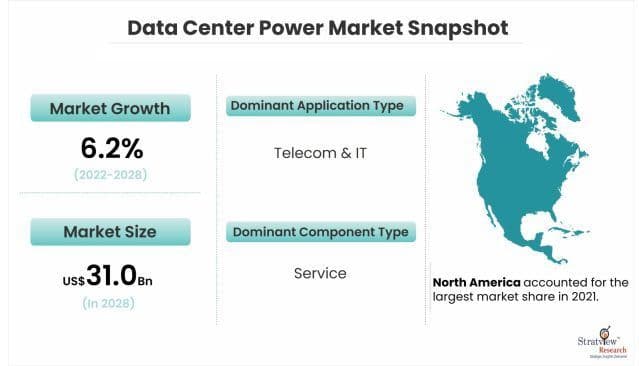
Data Center Power Market to Witness Robust Growth by 2028
The Data Center Power Market is segmented by Component (Service (Support and maintenance, training and consulting, System integration), Solution (Power backup, Power distribution, and measurement, Cabling infrastructure), Data Center Size (Small & Mid-Sized Data Center, Large Data Center), Application (Telecom & IT, Banking, Financial Services and Insurance (BFSI), Government, Other), and Region (North America, Europe, Asia-Pacific, and the Rest of the World).
Efficiency and Sustainability: Trends in the Data Center Power Market
As the demand for data storage and processing continues to soar, data centers play a pivotal role in supporting our increasingly digital world. However, with the growing concerns about environmental impact and energy consumption, the data center power market is witnessing a significant shift towards efficiency and sustainability. Let's explore some of the key trends driving this transformation.
Energy-efficient Infrastructure: Data centers are embracing energy-efficient infrastructure to reduce power consumption and operational costs. The focus is on utilizing efficient cooling systems, power distribution units, and uninterruptible power supplies (UPS). Advanced technologies like liquid cooling, airflow optimization, and dynamic power management are employed to maximize energy efficiency without compromising performance.
Renewable Energy Integration: To address the environmental impact, data centers are increasingly incorporating renewable energy sources. Solar, wind, and hydropower are being harnessed to power data centers, reducing reliance on fossil fuels and minimizing carbon emissions. Some data centers are even becoming self-sufficient by generating their own renewable energy or procuring it from off-site renewable energy projects.
Power Usage Effectiveness (PUE) Optimization: PUE, a metric that measures the energy efficiency of a data center, has become a critical factor in evaluating sustainability. Data centers strive to achieve lower PUE values by improving infrastructure design, enhancing cooling efficiency, and implementing advanced monitoring and management systems. Lower PUE not only reduces energy consumption but also lowers operational costs.
Energy Storage and Microgrids: The integration of energy storage systems and microgrids is gaining traction in the data center power market. Energy storage technologies, such as lithium-ion batteries, enable data centers to store excess renewable energy and use it during peak demand or grid outages. Microgrids provide resilience and reliability by allowing data centers to operate independently or in collaboration with the main power grid.
Waste Heat Recovery: Data centers generate a significant amount of heat, which is traditionally considered a waste byproduct. However, there is a growing focus on harnessing this waste heat for other purposes, such as heating nearby buildings or powering absorption chillers for cooling. Waste heat recovery technologies can significantly improve the overall energy efficiency of data centers while providing additional environmental benefits.
Artificial Intelligence (AI) and Machine Learning (ML): AI and ML algorithms are being deployed in data centers to optimize power usage and predict maintenance needs. These technologies enable real-time monitoring, dynamic workload allocation, and predictive analytics, resulting in efficient power utilization and reduced energy waste.
Efficiency and sustainability have become paramount in the data center power market. By embracing energy-efficient infrastructure, integrating renewable energy, optimizing PUE, leveraging energy storage and microgrids, exploring waste heat recovery, and harnessing the power of AI and ML, data centers are paving the way for a greener and more sustainable future. The ongoing commitment to these trends will not only reduce environmental impact but also drive operational efficiency and cost savings for data center operators.
Appreciate the creator